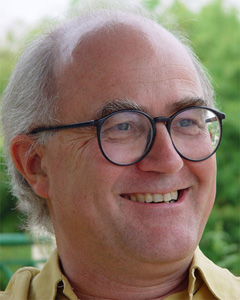 At 18, this drop-out joined the Dalai Lama. In Dharamsala in the early ‘70s, he entered “an intact pocket of modern Tibet,” where it “was as though a group of Italian hippies had wandered off into the Apennines and discovered in a remote valley a fully functioning papal court of the fourteenth century.” Alas, this Shangri-La failed to enchant this British-born skeptic.
At 18, this drop-out joined the Dalai Lama. In Dharamsala in the early ‘70s, he entered “an intact pocket of modern Tibet,” where it “was as though a group of Italian hippies had wandered off into the Apennines and discovered in a remote valley a fully functioning papal court of the fourteenth century.” Alas, this Shangri-La failed to enchant this British-born skeptic.
Despite a decade in the monastery, Stephen Batchelor declared himself a deep agnostic and a literal atheist. “No matter how hard I tried, I was incapable of giving more importance to a hypothetical, post-mortem existence than to this very life here and now.” He left the Zen retreat. He married a nun with whom he had fallen in love, after they “disrobed” to promote what emerged into a secular, non-theistic Dharma. He claims the same “grounded” attitude animated the historical Buddha. A dozen years after his admission of doubt as Dharma, Batchelor expands his Buddhism Without Beliefs (1997) into a “collage” that combines spiritual autobiography, travel to the Indian heartlands where the Buddha taught, and an examination of early Pali-language texts.
Batchelor—recalling Rudolf Bultmann’s textual reclamation of the “historical Jesus” in the later 19th century—seeks to strip the Indian-born preacher of those who in his name have elevated a simple exponent of human self-realization into the massive, gilded image of a deity. Batchelor rejects the Buddha as a guide towards liberation by karma and rebirth. His enlightenment, Batchelor explains, “did not encourage withdrawal to a timeless, mystical now, but an unflinching encounter with the contingent world as it unravels moment to moment.”
By scraping off the accretions of Brahmin thought, Batchelor shakes the Buddha free of glitter and incense. This scholar substitutes a radical humanist. He presents an existentialist founder of a civilization. The Buddha did not invent a religion. He did not direct us towards an afterlife. He did not further the Indian quest for an Oversoul. “Not-God” more accurately, Batchelor implies after a close study of the ancient Pali scriptures, comes closest to the original contexts that we can find. Siddhartha Gotama “was not a theist but nor was he an anti-theist. ‘God’ is simply not part of his vocabulary.”
While Gotama accepted the Brahmin outlook of gods and deities as marginal figures, he did not place them at the center of his cosmology. Instead, Batchelor argues, the Buddha’s “original approach was therapeutic and pragmatic rather than speculative and metaphysical.” Batchelor defends himself against “cherry-picking” texts, for he counters “it has ever been thus.” If Buddhism remains a living tradition, it must retain this flexibility.
This narrative displays similar fluidity. Batchelor tells of his inability to accept karma and rebirth, as opposed to scientific explanations for our mental constructs. He “never had the God habit,” so he entered the Indian monastery easily, adapting quickly to his surroundings. Ordained at 21, he seemed to float into another realm, spiritually and culturally. Yet he soon migrated from India to a Tibetan foundation in Switzerland, and then left for Korea. Tibetan Buddhism, suffocated him by its certainties; “while the uncertainty celebrated in Korean Zen brought me vividly, if anxiously, to life.”
His innate agnosticism forced him to confront how to live as a Buddhist without confidence of salvation in this or another life. “It is the willingness to embrace the fundamental bewilderment of a finite, fallible creature as the basis for leading a life that no longer clings to the superficial consolations of certainty.” He rejects any liberation based on delayed entry of his mind into an immaterial entity. He interprets the Buddha’s Four Noble Truths as
1) the embrace of suffering as fully known,
2) of letting go of craving for substantial truth or material support,
3) of experiencing the cessation of longing,
4) appropriately acting to cultivate transformation by the Buddha’s Eightfold Path. These terms remain a bit wordy, but they convey by Batchelor’s translations the essential first sermon of the Buddha. Batchelor discards “all passages that assume the multi-life worldview of ancient India.” This root text supplements the author’s eloquent, sparely told chapter “Embrace Suffering”.
Batchelor stresses the difficulty of honest inquiry. He reduces in pithy fashion the Four Noble Truths first expounded by the Buddha into: “Embrace, Let go, Stop:, Act!” “This template,” he notes, “can be applied to every situation in life.” It nourishes empathy and feeds imagination. Mindfulness, he accepts, makes one respond to daily specifics, rather than divine transcendence. “It serves as an antidote to theism, a cure for sentimental piety, a scalpel for excising the tumor of metaphysical belief.”
As this citation demonstrates, Batchelor sets out his theology without “theos”. Fresh perspectives emerge. Celibacy may have preserved a professional cadre handing down Dharma, but monastic institutions—as shown by the collapse of Buddhism before Muslims in India or Communists in Tibet—cannot rally troops against armies. “A reflective and educated laity” separate from “devout but often illiterate” laypeople or a theological community of contemplatives appears, as he and his wife have pioneered, a relevant model for seekers.
Click here to read the end of this article
Source: popmatters.com




